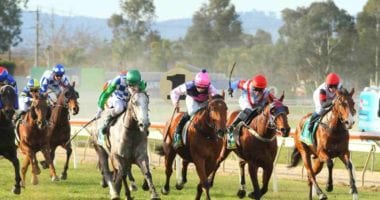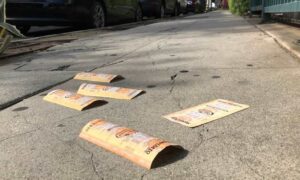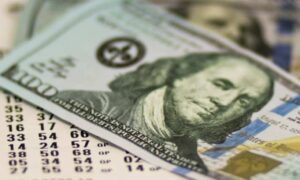
The Mountain State is once more affected by COVID-19 as the West Virginia Racing Commission has officially announced the cancellation of the highly anticipated West Virginia Derby, which carried a prize of $500,000.
This year’s annual event, scheduled for August 1st, took place at the Mountaineer Casino.
In addition to the derby, the $200,000 WV Governor’s Stakes was also called off, despite being scheduled for the same day.
Mountaineer Park initially planned to host races without spectators. However, concerns escalated regarding the participation of teams from different states.
Due to the absence of a safety plan and the considerable risk associated with each horse having an owner, trainer, and jockey, the commission decided that canceling the event was the most appropriate course of action.
Commission executive director Joe Moore stated in a straightforward manner, as reported by the Charleston Gazette-Mail.
Concerns about COVID-19 restrictions are a major contributing factor to this.
The constant rearrangement of the national racing schedule was another contributing factor.
The regular plans of all three Triple Crown races had to be altered. These races include:
- Kentucky Derby
- Preakness Stakes
- Belmont Stakes
Despite the disruptions caused by the coronavirus, the Kentucky Derby and Preakness races have yet to occur.
According to Jim Colvin, the manager of racing operations for Mountaineer, a minimum of two thoroughbred owners have decided to withdraw from the WV Derby in order to prioritize participation in larger races.
The Kentucky Derby for this year has been rescheduled to take place on Saturday, September 5th.
Currently, Colvin has mentioned that there are no immediate plans for a makeup date.
In addition to the racing commission’s announcement that they will run out of funds as early as the beginning of next year, this unfortunate news adds to the existing challenges.
WV Racing Commission’s Financial Struggles
During the past few months, the coronavirus shutdown has had a significant impact on every business across the country, including West Virginia. Despite being one of the healthiest places in the US, WV has experienced substantial financial losses.
Naturally, the sportsbooks and casinos in WV experienced a significant decline in the number of wagers they could accept, compared to their usual volume.
The WV Lottery’s revenue would not exist if it were not for the online sports betting apps available in the state.
The state’s racing commission is facing a similar situation. Moore stated that they experienced a loss of more than $550,000 in earnings over the course of three months. As a result, the commission’s reserve funds have now dwindled down to $575,000.
Although it may seem like a substantial amount, the commission has utilized $900,000 in funds since June 2019.
Moore delved into the necessary steps to rescue horse racing in WV, emphasizing that
It is imperative for the Racing Commission to pursue legislative changes during this session to secure additional sources of revenue due to the loss of revenue and depletion of general administrative accounts.
The racing commission in WV solely relies on tax revenue generated from betting activities at the state’s four racetracks, receiving no funding from general revenue sources.
The tax rates fluctuate based on the amount of money wagered, thereby influencing the commission’s earnings in direct proportion to the increase in the overall betting handle.
The COVID-19 shutdown has resulted in a decline in attendance and betting on the races, putting the commission in a difficult situation.
The purpose of this tax is to fund various expenses, such as salaries, benefits, and operational costs, that are necessary for the smooth functioning of everything. However, the racing commission now requires support to fulfill these obligations.
WV Derby Fallout
The cancellation of the WV Derby this weekend only worsened the situation. The Derby and Governor’s Stakes races are highly anticipated horse racing events that attract a significant following each year.
Both would have undoubtedly earned a considerable sum of money from bets.
Moore and the racing commission need to shift their focus towards the future now that the weekend is over.
Regrettably, it seems that Moore’s efforts have yielded little success thus far. In December, he raised the financial concerns to commissioners. During the winter period, Moore expressed the following:
We are depleting our reserve fund and general administrative fund at a rate of $50,000 per month. If this continues, both funds will be completely exhausted by the end of FY22 (the 2021-22 budget year, concluding on June 30, 2022), with a total depletion of $600,000 annually.
It appears that the current date could be much earlier, considering the expenditure made by the commission in the past year.
Hopefully, legislation will be able to pass and secure extra funds.
Commissioner Ken Lowe expressed confidence that the Senate Finance Committee would be able to devise a solution, as stated to the Charleston Gazette-Mail.
I am confident that they will meet the funding requirements.
The racetrack at Wheeling Island has made the decision to remove the director of racing role from its staff. Instead, they have decided to merge this position with the job title of racing secretary temporarily.
Kim Florence, the regional president and general manager of Wheeling Island, expressed the necessity of this transition.
Unfortunately, our business has been severely affected due to the unfortunate circumstance of COVID-19.
The issue will be revisited by the commission during the January meeting as planned.










